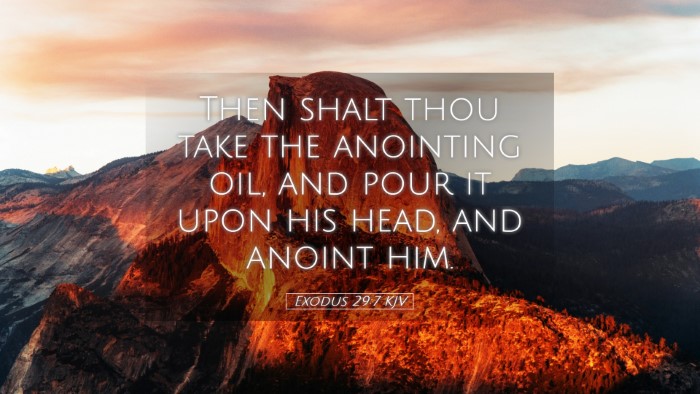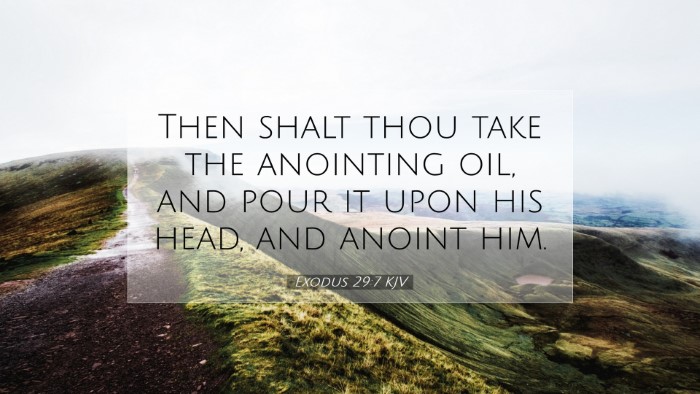Exodus 29:7 Commentary
Verse Text: "Then shalt thou take the anointing oil, and pour it upon his head, and anoint him."
Introduction
Exodus 29:7 is a pivotal verse in the consecration of priests, particularly Aaron and his sons, as they are set apart for service in the Tabernacle. The act of anointing with oil is rich with theological significance and serves as a key element in the ceremonial practices of ancient Israel. This commentary provides insights from several public domain sources, offering a comprehensive understanding of its implications for both the historical context and its application today.
The Process of Anointing
Matthew Henry notes that the anointing oil symbolizes the Holy Spirit's empowerment and setting apart for divine service. This anointing served two primary purposes: it designated the individuals as God’s chosen instruments and it signified the divine blessing upon their ministry. The pouring of oil rather than merely applying it in a smaller quantity communicated a fullness or abundance in God’s grace and spirit upon them.
The Symbolism of Oil
- Holiness: The oil represents the holiness required for priestly duties.
- Empowerment: It signifies the holy empowerment to carry out their responsibilities.
- Dedication: The act illustrates their complete dedication to God’s service.
Theological Implications
Albert Barnes emphasizes that the practice of anointing is not arbitrary but divinely instituted, serving as a demonstration of God's authority over the priesthood. By choosing oil for this sacred rite, God established a tangible connection between the physical and spiritual realms. This act symbolizes that the priest acts on behalf of the people, empowered directly by God’s presence.
Connection to Christ
Moreover, this anointing of Aaron encompasses prophetic insights pointing toward the ultimate High Priest, Jesus Christ. Adam Clarke articulates this prophetic significance, seeing the anointing of priests in this manner as a foreshadowing of the anointing of Christ with the Holy Spirit, marking Him as the Messiah. This reinforces the theological understanding that Jesus is the fulfillment of the priestly role and the ultimate mediator between God and humanity.
Practical Applications for Today
As pastors and theologians explore this verse, they may draw parallels to modern practices of ordination and consecration within the church context. The act of anointing has continued significance, symbolizing the call to ministry and the need for divine empowerment. The insights from these commentaries encourage leaders to reflect on their own calling and the importance of being set apart for God’s purposes.
Reflection Points
- The Call to Ministry: Just as Aaron was set apart, so too are modern leaders called to serve with integrity and dedication.
- Dependency on the Holy Spirit: The necessity of the Holy Spirit in empowering leaders today remains paramount.
- Acknowledging God's Authority: Recognizing that any authority held by church leaders is derived from God’s anointing.
Conclusion
In summary, Exodus 29:7 encapsulates profound themes of divine selection, empowerment, and the sacred nature of ministry. The commentaries of Matthew Henry, Albert Barnes, and Adam Clarke collectively highlight the multifaceted significance of anointing oil, its role in the establishment of priesthood, and its lasting implications for the Church today. As modern-day believers continue to seek God's guidance in their lives and ministries, this verse serves as a reminder of the serious nature of divine callings and the empowerment needed to fulfill them.


